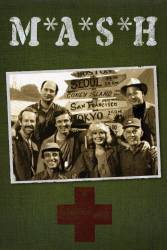Dear Sigmund - S5-E7
Corrected entry: In this episode, Sidney Freedman writes a letter to Sigmund Freud, detailing his experiences at the 4077. Freud died September 23, 1939. M*A*S*H is set during the Korean War, June 25, 1950 to July 27, 1953.
Corrected entry: While Klinger is collecting toilet paper from the latrines, he's singing/chanting the theme music from "Bridge on the River Kwai" (known as the Colonel Bogie March, BTW). That movie wasn't released until several years after the war.
Correction: The music itself was written during World War I and was associated with soldiers during both World Wars. Klinger would have been familiar with it before the release of the film that kept it famous.
Correction: The famous march whistled by the POW in the movie wasn't composed for it but is actually the "Colonel Bogey March" composed in 1914 by Lieutenant F. J. Ricketts. It became immensely popular with the troops in WW2, with the somewhat rude text "Hitler has only got one ball." This is also the reason why it was whistled in that movie, because those lyrics wouldn't have gotten past the censors. That it is often (wrongly) called the "River Kwai March" today is due to the fact that the actual movie theme called that was a march superimposed on the whistling POW in the movie. So when you're listening to the movie theme, you're actually listening to two marches: Col. Bogey March, and the River Kwai March at the same time.
The Most Unforgettable Characters - S5-E14
Corrected entry: In the scene where Hawkeye and BJ are actually fighting while pretending to fight; when they enter the tent, Frank is polishing his boots and whistling the theme music to The Muppet Show (1976). While The Muppet Show had already been screening for a year when this episode was first broadcast, the music was unknown in the 1950s as it was written specifically for the show by Muppets creator Jim Henson, and Sam Pottle.
Correction: The song that Frank is humming is "Happy Days are Here Again", which was copyrighted in 1929.
Dear Sigmund - S5-E7
Corrected entry: After being loaded with wounded, an ambulance accelerates, turns left and moves out of sight. Immediately after there is the sound of a crash, and the ambulance is lying on its left side. Radar states that it turned too fast and rolled over...but in that case, it would be on its right side.
Correction: The ambulance driver was quickly heading for the next left turn on the road out of camp, but instead wound up driving into the sloped rocky ditch on his left, hence the vehicle rolled onto its left side. Nothing wrong with its depiction.
Corrected entry: When Hawkeye and Radar are talking to the recon men, an explosion goes off behind them, with no sound of the incoming shell.
Corrected entry: At the end of the episode, Hawkeye asks Sidney if he's going crazy. Sidney responds, "No. A little farshimelt perhaps, but not crazy." Farshimelt in Yiddish means spoiled, moldy. Sidney probably meant farmisht - mixed up.
Correction: Elsewhere in the series, Hawkeye himself describes mental conditions with the word "moldy", which indeed is the English translation of farshimmelt, see also the German "verschimmelt" of the same meaning. Since obviously to the writers "moldy" was a legitimate if somewhat humorous description of a less-than-optimal mental condition, the word "farshimmelt" is probably not a mistake but an intentional use.
Corrected entry: Hawkeye is discharging his sidearm into the air. It seems to be a .45 cal. M1911A1, which was the most popular officer's sidearm during the Korean war, but he only shoots 5 times before announcing that that's all his bullets. The M1911A1 had a 7 shot magazine. (Potter seemingly did shoot 7 times.) Even allowing for the fact that his gun might not be fully loaded, muzzle flash is visible only after the third shot. The first and last two have none. (00:21:35)
Correction: The Gun wasn't fully loaded, or jammed. And muzzle flash isn't always visible on film.






Correction: Yes, Sidney's addressing Sigmund Freud in his "letter" but it's not an actual letter he's writing, it's Sidney's therapeutic way of expressing and venting his own private thoughts and feelings regarding coping mechanisms to the founder of psychoanalysis, whom he greatly respected. Sidney knows that Sigmund Freud has been dead for over a decade, and BJ even commented to Sidney that writing a letter to Sigmund Freud is a little crazy, but Sidney's reply says it all, "who better than he would understand."
Super Grover ★